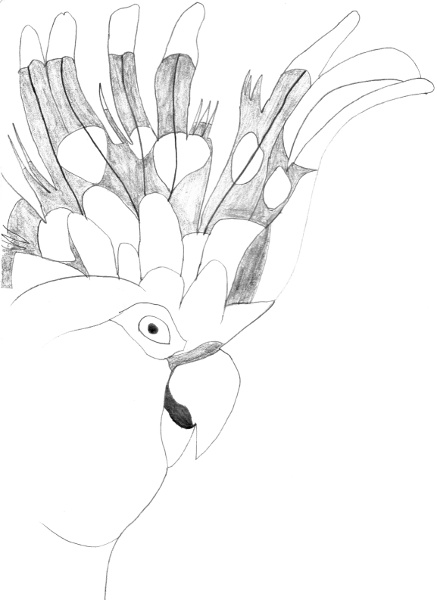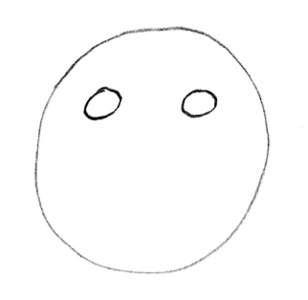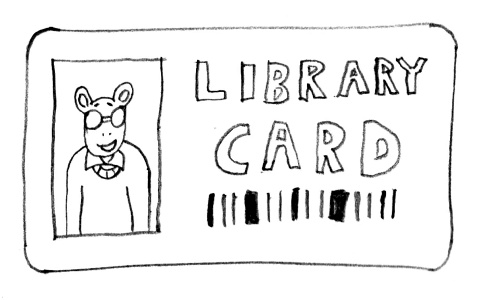Lophochroa leadbeateri



There's a paradox when you're drawing straight lines. It might seem like drawing a straight line would be like balancing on one leg: just get really really good at correcting the wobbles until eventually they disappear. But actually it's the opposite; if you draw slowly and deliberately, your line will look like a squiggly mess because of the constant minor corrections.
In fact, the trick to straight lines is to draw quickly, without thinking about them too much. At first, this will look worse, but eventually it improves past the point you could get using the slow and steady method. The reason for this is that you're training a different thing; your hand is learning how to move in a straight line rather than a more complex hand-eye-brain feedback loop. Instead of learning how to correct your mistakes, you're learning how to not make them in the first place.
However, none of that can happen while your real-time feedback mechanism is getting in the way, and I think that's an important lesson in many skills. In singing, beginners often "scoop", singing the wrong note and sliding around until it sounds right, rather than singing the right note to begin with. In writing, the desire to edit your words as you write them makes it harder to learn how to get your thoughts out in one consistent stream.
It's useful to develop your ability to respond quickly to feedback and corrections. However, past a certain point you're just developing your feedback skill at the expense of the real skill. Ultimately, an important part of developing expertise is developing the confidence to act boldly, operating on the assumption of good results rather than bad ones. When that's the case, you can use feedback to inform your practice, but you don't need to rely on it.

A lot has been said about happiness and how central it is to life, to work, relationships and so on. Maybe, but at least in one sense nothing could be further from the truth. Happiness is neither a necessary nor sufficient condition for getting things done, because it's not actually what motivates us. When we're making a decision, it's not based on our happiness now, but the happiness we expect. To put it another way, it's not reward, it's the expectation of reward.
This might seem like an arbitrary distinction, but actually it's a very important one. A reward is an actual thing with an actual value, but to get an expected reward that value has to make its way through our statistical processing and ends up as an estimation. Actual reward can't be faked, but expected reward can. Your statistical processing can be wrong, and often is in very predictable ways. Worst of all, those predictable failures can be exploited to motivate you without providing any actual reward.
Sometimes that can be useful, because when your predictive system isn't sophisticated enough to see the value in something, you can trick yourself into doing it anyway. Other times, though, those tricks are used against you in the form of easy distractions or systems designed to motivate you for someone else's benefit. This can be as simple as random rewards in video games or as complex as notification systems and endless-scrolling novelty-optimised information feeds.
All of which is to say it's perfectly possible, even easy, to do things for no reward, or for an expectation of a reward that doesn't exist. And it's equally possible to do something that doesn't make you happy, and even to do it quite well. But the fact that happiness is optional doesn't mean you should ignore it. In fact, the opposite. You can't take it for granted; just because you're motivated to do something doesn't mean you're enjoying it, and just because you're doing things doesn't mean you're happy.
Being able to function without happiness means that if you want it then you have to make a particular effort to build it into what you do. Your systems have to be designed to motivate you, but also to give you genuine rewards for that motivation. You need to ask not just "will I enjoy this when it's done?", but "am I enjoying it now?" You can work without happiness, but it's not exactly a pleasant way to be, and if you spend too long without designing happiness into things, there's a risk you'll forget how.

I think that libraries, as in the big buildings with books in them, are becoming slowly irrelevant. Paper books may not disappear overnight, but their days as a primary medium of information are definitely finished, and it's most likely that book-like forms will be almost entierly electronic in the not-too-distant future. More generally, the idea of a library as the gateway to information doesn't really make sense anymore. The internet has largely taken over that role, and does it very well. However, I don't think that means the library should die.
Instead, I'd like to see libraries reborn. Instead of the gateway to information, they could become the gateway to intellectual life. There's currently a lack of casual intellectual spaces, with more serious applications of intellect confined to either professional or academic spaces. That's fine if you want to use your brain to make money or to write papers, but what about if you just want a good place to think, to bounce ideas off others, or to meet people with similar interests?
The first part of this would be to revamp libraries to feature many more work spaces. A lot of university libraries do this, but I haven't seen it as much in public libraries. So desks, chairs, whiteboards etc. Not just areas for quiet study, but for discussion and actual work. In fact, a good goal would be to act as a kind of public equivalent to the private co-working spaces that have become quite popular in recent years. However, to offset the value of getting free work space, you have to commit to give a certain number of hours (say, 1 in 10) to helping others. So you can use the library as a free office, as long as you also let the library use you as a free resource.
The second would be to add a number of social and intellectual events after hours. Talks in the evenings, social gatherings afterwards, that sort of thing. Ideally something would be available every night, but that might not really be feasible at smaller libraries. Regardless, it should be possible to provide a kind of alternative nightlife based on knowledge and discussion rather than dancing or entertainment. Most likely the easiest way to achieve this would be to adopt some existing events like book clubs, poetry events or other meetups and relocate them to the library. Over time, though, as the library forms its own community it might be easier to have more home-grown events.
The point is to rebuild the library as the centre of intellectual life. There's no real need for another place to go to find out about things anymore, but there is a need for a place where you can go to find out what other people think, to have discussions, trade ideas, and find answers to questions you wouldn't have thought to ask.
I've been thinking about that linearisation idea I wrote about a while back. For whatever reason, it seems like our brains don't natively think in coherent, linear sequences. We can believe things that are totally incoherent until we try to verbalise them. We can mistakenly think we understand something but realise we have no idea when we try to explain it. We can solve problems by describing them to an inanimate object that we can't figure out just by thinking.
Most of what I wrote before was about the usefulness of linearising, but what about the opposite: deliberately staying non-linear? There are certain things that are much easier to do in that non-linear, non-verbal space. Because things don't have to make sense, your thoughts are free to wander and associate, often yielding surprising and creative ideas. They appear to come from nowhere, but in reality they just came from somewhere you can't linearise the path back to. It seems useful to cultivate non-linear thinking as well.
Beyond its usefulness as a thinking tool, non-linear experiences can be quite compelling. Dreams, for example, are totally incoherent experiences that you can't explain to anyone else, but they are very compelling at the time. Even awake, you sometimes find yourself in a particular frame of mind that can't really be conveyed well. You're looking out at a city at night and anything seems possible. You finish binge-reading a book and the real world's colours look different. All your worries get together and summon you to a meeting, talking over each other to make sure they get heard.
These things are hard to put into words because they're a grab-bag of disconnected thoughts and feelings, non-linear by nature. But instead of trying to marshall them into some order, could we instead find some way to communicate them in their native form? I don't know exactly what this would look like. Sounds? Shapes? Words? Direct electrical stimulation? It's not clear. But the nice thing is that there is a simple test: just transmit information to someone else that they understand, but falls apart when they try to explain it.
A non-linear communication system's ultimate goal is to share a dream.